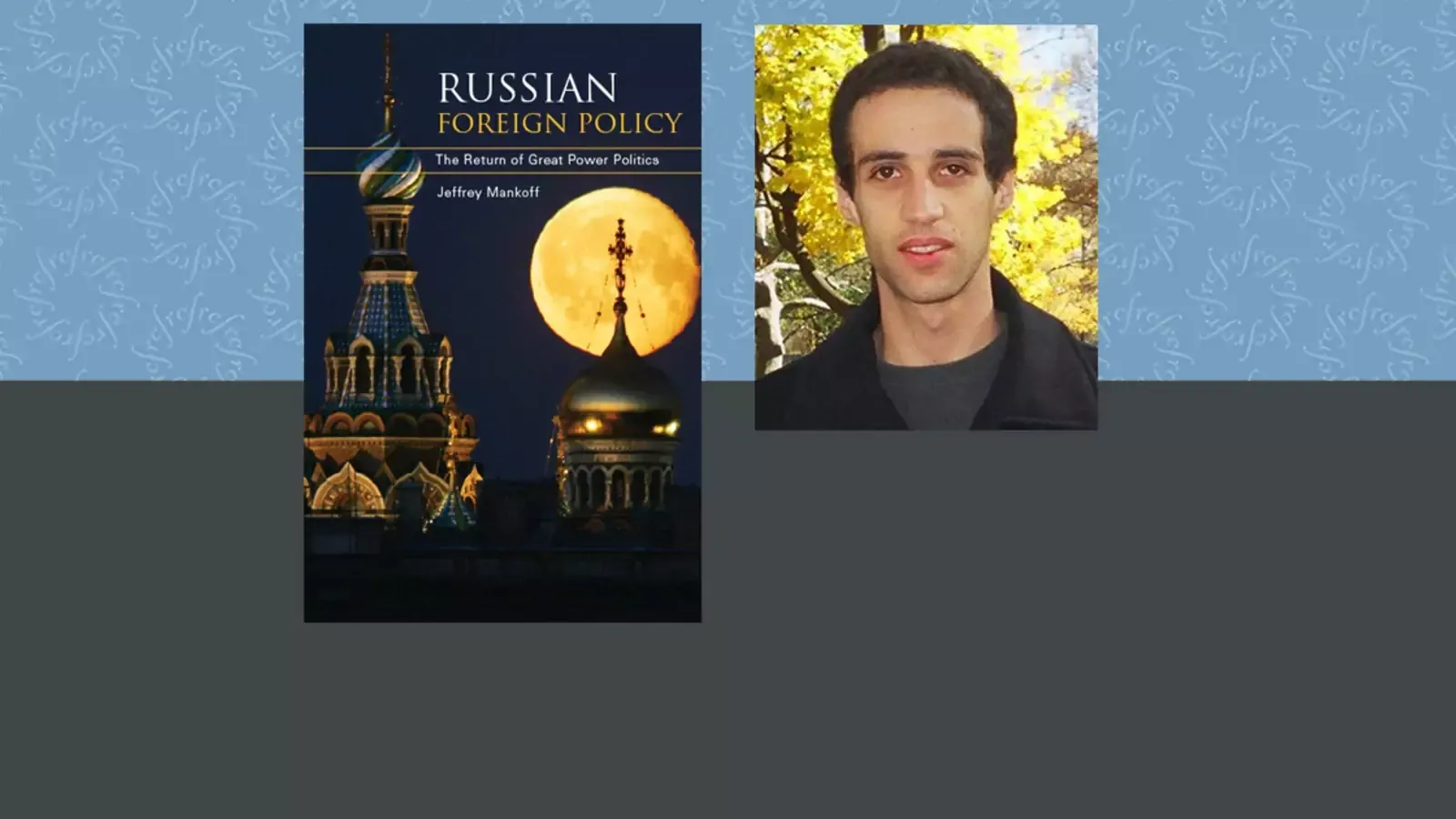Russian Foreign Policy

Introduction
In this book, CFR Fellow Jeffrey Mankoff analyzes Russia’s interactions with major global actors and concludes that today’s Russia is more interested in restoring what its leaders consider to be its rightful place among the world’s major powers than in directly challenging the West. Teaching notes by the author.
Summary
The Council on Foreign Relations book Russian Foreign Policy: The Return of Great Power Politics analyzes the development of Russia's foreign policy since the collapse of the Soviet Union in 1991. It argues that following a brief period of support for binding Russia to Western institutions, the Russian elite came to adhere to a worldview emphasizing Russia's importance as a major power and pillar of the international order. For this reason, the Kremlin has pursued a foreign policy course designed to maximize Russia's ability to act as a fully sovereign great power—in partnership with the West when possible, and in opposition to the West when necessary. By tracing the development of a broad elite consensus about Russian foreign policy and analyzing in depth Russian policy toward the United States, Europe, China, and the former Soviet states, Russian Foreign Policy helps students understand why Russia remains stubbornly defensive of its interests and opposed to the emergence of a Western-dominated world. It also helps students understand why Russia is not an inveterate foe of the United States, even as it insists that Washington respect its interests.
This book, along with the teaching notes, discussion questions, and suggestions for further projects, is ideal for courses on international relations, and Russian politics and foreign policy.
Discussion Questions
Courses on International Relations
- In what ways is Russia's approach to foreign policy similar to that of other major powers such as the United States or China? In what ways is it different? What accounts for these differences?
- Why did Russia and the former Soviet satellite states in Eastern Europe adopt different foreign policy strategies following the end of the Cold War? In contrast to Poland, Hungary, and other Eastern European states, why did Russia never seriously consider joining NATO or the European Union?
- Can a strategy designed to integrate Russia into European institutions succeed? If so, what steps will Europeans (and Americans) have to take for it to work? Can existing institutions be used as a platform for integrating Russia, or will it be necessary to design new economic, political, and security institutions? If the latter, how should these differ from existing institutions?
- Are Russia and China allies, rivals, or both? What factors have led to the Russo-Chinese rapprochement over the past two decades? Should the West be concerned by the development of closer ties between Moscow and Beijing?
- How has NATO expansion affected relations between the Western powers and Russia? How has Russia's position on NATO expansion evolved since the 1990s?
- Describe the long-term impact of the 2008 Russo-Georgian war on the international balance in Europe and the Caucasus. What did Russia gain from the war? What did it lose? Could the West have prevented the war?
Courses on Russian Politics and Foreign Policy
- How can conflicts in the post-Soviet space be minimized? Should the West accept a greater degree of Russian influence and control over the policies of its neighbors? Should the West reduce its support for countries such as Georgia in order to promote better relations with Moscow?
- How does Russia define its national interests? What role does ideology play in Russian foreign policy? Does the structure of Russia's government affect how the country assesses its national interests?
- Should neighboring countries worry about Russian investment in their economies? Is this investment (especially by state companies) a tool of political influence? If so, what can be done about it?
- What role do international institutions and international law play in Russia's foreign policy strategy? Why does Moscow prefer some institutions (such as the UN Security Council) to others?
- Why does Moscow emphasize bilateral relations rather than multilateral frameworks for addressing major security challenges?
- What role does power play in Russian foreign policy strategy? What does power mean in the Russian context? What steps has the Kremlin taken to amass power and what challenges does it face?
Supplementary Materials
- Ambrosio, Thomas, Challenging America's Global Pre-Eminence: Russia's Quest for Multipolarity, 2005 (Aldershot, UK: Ashgate).
- Dibb, Paul, "The Bear is Back," The American Interest, November/December 2006.
- Goldgeier, James M., and Michael McFaul, "What to do about Russia," Policy Review, October/November 2005.
- Katz, Mark N., "Primakov Redux? Putin's Pursuit of 'Multipolarism' in Asia," Demokratizatsiya, Winter 2006.
- Kozyrev, Andrey, "The Lagging Partnership," Foreign Affairs, May/June 1994.
- Lo, Bobo, Putin and the Evolution of Russian Foreign Policy, 2003 (London: Royal Institute of International Affairs).
- Lucas, Edward, The New Cold War: Putin's Russia and the Threat to the West, 2008
- (New York: Palgrave Macmillan).
- Monaghan, Andrew, "Calmly Critical: Evolving Russian Views of U.S. Hegemony," Journal of Strategic Studies, December 2006.
- Nicholas, Thomas M., "Russia's Turn West," World Policy Journal, Winter 2002–03.
- Pifer, Steven, "What Does Russia Want? How Do We Respond?" Scowcroft Institute Lecture, September 11, 2008.
- Russia's Wrong Direction: What the United States Can and Should Do, Council on Foreign Relations-sponsored Independent Task Force Report, March 2006.
- Stent, Angela and Lilia Shevtsova, "America, Russia, and Europe: A Realignment?" Survival, Winter 2002–03.
- Trenin, Dmitri, "Russia Leaves the West," Foreign Affairs, July/August 2004.
- Tsygankov, Andrei P., Russian Foreign Policy: Change and Continuity in National Identity, 2006 (Lanham, MD: Rowman & Littlefield).